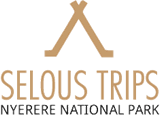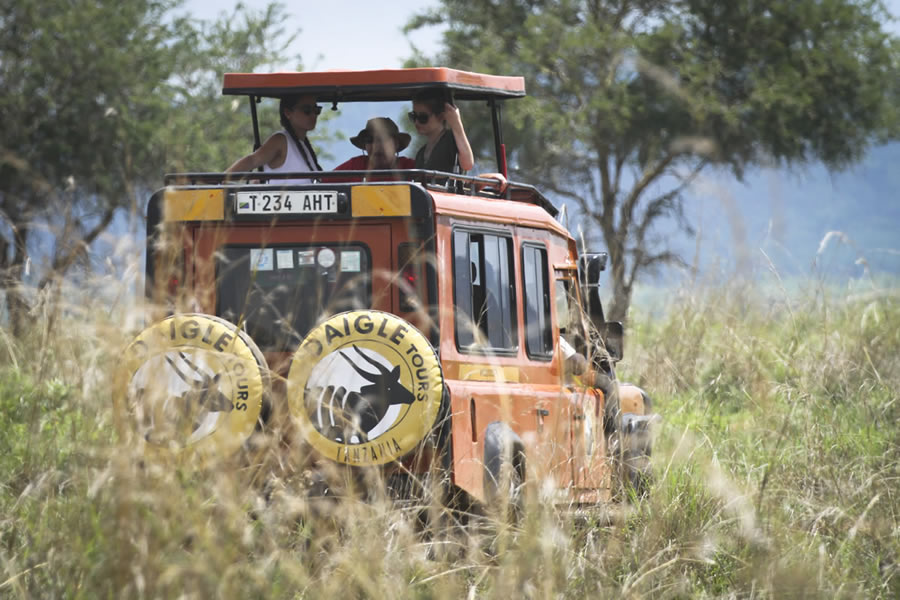Getting to Nyerere National Park
Daigle Tours can organise your transport to Nyerere National Park from anywhere in Tanzania. To give you an idea of distances, Selous is about a four-hour drive from Dar Es Salaam, the capital city and main hub for international flights.
However, most of the guests in our luxury tented accommodation prefer to avoid what can be a rough overland journey and fly here.
Regular flights leave from Dar Es Salaam and Zanzibar Island to Nyerere National Park or Ruaha which is about a two and half hour drive north of Selous.
Safety
Tanzania is regarded as one of the safest countries in Africa for tourists. What little petty crime exists is mainly confined to the urban centres. Therefore, travelling to and around Nyerere National Park is very safe.
During walking safaris, a qualified guide will accompany you at all times. Our guides are armed with a rifle and trained in their use to protect guests if needed, although this is very rare.
Guest safety is our top priority and we do everything we can to ensure that you’re safe, including escorting you from the bar or restaurant back to your tent after dark.
When you arrive, we will brief you about safety and the best way to deal with any unexpected wildlife encounters.
Health
We recommend you consult with your doctor before visiting Tanzania. Pre-travel vaccinations are commonly recommended for travellers.
Malaria can be a health issue throughout Tanzania but it is easily protected against. While some guests choose to take anti-malarial medication during their time in Tanzania, the best way to prevent getting malaria is to avoid getting bitten.
We recommend you protect yourself from mosquitoes during the early morning and evenings with long-sleeved clothing and long pants. Regular application of mosquito repellent will protect you further and it’s best to bring this with you. Check the ingredients of mosquito repellent before buying it and aim to choose a brand that contains at least 30% DEET.
Guests in our luxury tented accommodation have full mosquito nets over their beds to ensure you sleep soundly.
Finally, while our camp is powered by solar and wind power with backup generators for emergency use, guests in our luxury tented accommodation are welcome to use a fridge to store any medication if needed.
If you have any special concerns or medical requirements please let us know before you arrive so that we can help you stay in good health.
What to bring
We recommend you pack light to make travel and packing as fast and easy as possible. Our camp is a relaxed environment so there’s no need to dress up for evening meals. Most of our female guests tell us that they enjoyed not having to worry about hair or makeup during their safari.
Here are a few items we recommend you bring:
- Proper clothing for the environment – Including comfortable walking shoes, a sun hat, clothes in neutral colours for daytime game viewing and long-sleeved tops and long pants for the evenings. We recommend clothes in light, breathable fabric or technical materials from adventure specialist stores such as Kathmandu, Anaconda or Patagonia;
- Personal medication including anti-malarials if you plan to take them;
- Mosquito repellent, ideally a brand that contains at least 30% DEET.
- Torch;
- Batteries;
- US dollar bills – Useful for tips and buying small souvenirs as they are accepted everywhere, even in local communities;
- Soothing cream for insect bites or sunburn;
- Lip balm and sun protection cream;
- Miniature bottles of personal items such as hair conditioner and moisturiser, especially during the dry season.
- Your spirit of adventure – No matter how carefully we organise our trips, in Africa sometimes things just don’t go to plan. You may have to deal with muddy roads, bumpy, dusty tracks or even a herd of elephants blocking the runway. But it’s worth it for the rare privilege and life-changing experience of viewing African wildlife in its natural environment.



